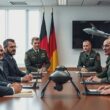Concerns are mounting within Airbus and among German political circles regarding the future development of the Future Combat Air System (FCAS), a collaborative project aimed at establishing European air defense capabilities. The initiative, intended to provide a network of fighter jets and drones and reduce reliance on US technology, has been hampered by protracted negotiations between Airbus and Dassault Systèmes, the partners involved since 2017.
Thomas Pretzl, head of the Airbus Defence works council, has publicly questioned the viability of the current partnership, suggesting that the FCAS program may proceed without Dassault’s involvement. He indicated a potential preference for alternative European partners deemed more suitable for the project.
The significance of FCAS is underscored by the increasingly tense geopolitical climate, with frequent violations of NATO airspace by Russian aircraft over the Baltic Sea. Industry representatives and politicians alike emphasize the necessity of a next-generation air combat system for Europe’s security. Michael Schöllhorn, head of Airbus’s defense division, reiterated Airbus’s commitment to developing such a system.
The German government is actively seeking a resolution with France, with a focus on preventing security objectives from being compromised by industrial disagreements. Thomas-Röwekamp, Chairman of the German Bundestag’s Defense Committee, warned against allowing such industrial negotiations to derail crucial security goals.
Within the industry, discussions are underway to explore alternative development pathways. These alternatives include potential collaboration with British defense firm BAE Systems or Swedish company Saab, as potential replacements for Dassault in the project. The situation remains fluid as stakeholders attempt to secure the long-term viability of the Future Combat Air System.





